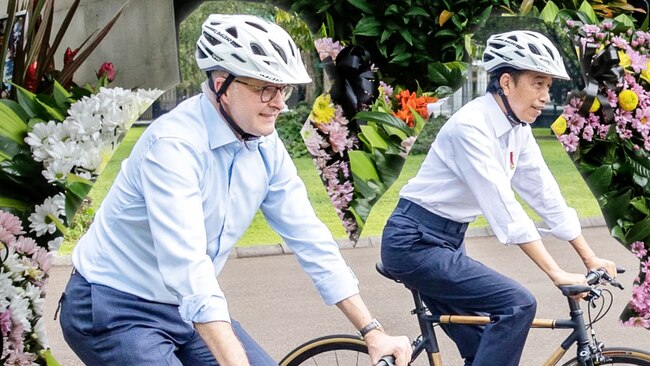The '9/11 of our region' didn't work
Terrorists wanted to drive a wedge between Indonesia and Australia using deadly force. Instead the opposite happened.

Terrorists wanted to drive a wedge between Indonesia and Australia using deadly force, the opposite happened.
The Bali bombings changed Australia's relationship with Indonesia - for the better.
The brutal, bloody murder plot to kill and maim as many Westerners as possible scarred both Australia and Indonesia, but the response forged an unbreakable bond.
Former WA Commissioner to Indonesia Ross Taylor calls what happened that night 20 years ago on the streets and inside the nightspots of Kuta, "The Indonesia Paradox".
"Ironically, in the trade sector we work so hard in our dealings to forge legitimate partnerships instead of transactional - 'we sell, they buy' relationships and this created the former after it was shown how our public institutions can work together," Taylor told The Oz.
"It was a wake up call in Indonesia. The anti-West sentiment and thirst for terrorism had infiltrated Indonesia and gone too far. After a pretty challenging time around the world, it was just after 9/11 and George Bush had declared war, but on the streets on Jakarta there was a lot of support of for their Muslim cousins. There was an ill feeling in Jakarta but what happened in Bali devastated the country, 38 of their civilians were killed too."
Defence personnel, doctors, nurses, police and volunteers in Australia and Indonesia sprung into action, hours after the attacks, in an immensely chaotic, dangerous but ultimately caring response.
Just 17-hours after the blasts torn through the beating heart of Bali, the RAAF began its largest aero-medical evacuation since the Vietnam War.
More than 66 badly injured people were flown to Darwin and Perth for treatment. Australian Federal Police officers headed to Bali and were aided by FBI agents and forensic experts who examined the Sari Club and Paddy's Bar for weeks.
It was a huge shock for the Indonesian Police.
The ADF and AFP came in to offer support to Polri [the Indonesian National Police] and they formed a partnership there in the rubble. Now there are training programs, the special Densus 88 Force was established, which is an elite and exclusive counterterrorism squad that is still aided by our Signals Directorate.
Through the combined efforts and ongoing intelligence sharing and training, Indonesia has come close to wiping out fringe terror groups like Jemaah Islamiaah, the al-Qa’ida-linked militant group to which the Bali bombing ringleaders belonged.
"These organisations now are pretty much shells of themselves. Not only is Bali infinitely safer because of the bilateral relationship between Indonesia and Australia, but the entire region is. Indonesia sits between us and China in the South Pacific so it makes sense we maintain our strong ties," Taylor said.
Reform systems have also been implemented in prisons, that were once hot beds for radicalisation
DIVE DEEPER: The youngest Bali bombing survivor now saves others
It's a sentiment former Prime Minister John Howard echos.
"[The response] It saw the best of Australia and the best of Australians on display. The co-operation of civilians, police and military was magnificent. The way in which everyone came together.... irrespective of whether you were Australian or Indonesian, instinctively, I was just so very proud," Howard said on Wednesday.
"[Because] Bali was so popular and so loved by so many Australians it was almost as if it was a terrorist attack on home soil. It was so violent and brutal, to call it an act of terrorism was too antiseptic. It was a brutal, unprovoked, terrible, unjustified murder of innocent people, including 88 Australians," former Prime Minister John Howard said on Wednesday.
"It was brutal, mass murder."
Prime Minister Anthony Albanese has continued to uphold our relationship with Indonesia.
His first official international trip was to Indonesia just weeks after the election.
“My first visit as Labor leader was to Indonesia and I wanted to make sure that my first bilateral visit was here to Indonesia,”Albanese said back in June.
Speaking at a Bali bombing memorial in Sydney at the Coogee Dolphins rugby league club, which lost six of its members in the 2002 bombings, Albanese said what happened that night “struck at the joy of a free people” and “sought to create terror”.
“But people ran towards the terror, to do what they could do for friend and stranger alike,” Albanese said. “What the architects of this slaughter achieved was to make us reflect on what we most truly value – and to hold on to it more tightly than ever before."
"That night the terrorists could not achieve their aim. What they struck they could not defeat. Because what they struck at was the idea of us, the fabric of ideals and dreams and compassion and fairness."


